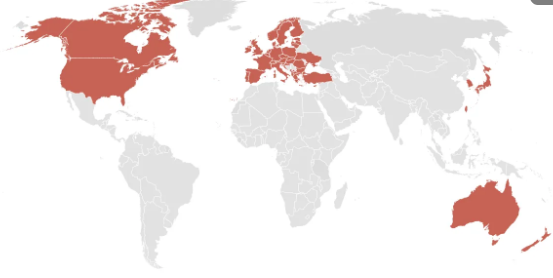West against the rest (GS Paper 2, International Relations)

Context:
- NATO, marking its 75th anniversary, appears jubilant, yet a critical examination reveals a somber reality.
- Initially established to defend member states from aggression, NATO’s history is marred by a lack of actual threats.
- Instead, it has been implicated in over 200 military conflicts, including major ones like the bombing of Yugoslavia, invasion of Iraq, and military interference in Syria.
- These actions have often resulted in devastation rather than stability, raising questions about NATO’s objectives and methods.
Expansion and Provocations:
- Despite assurances to the contrary, NATO has expanded its reach through five waves since 1991. Notably, the transformation of Ukraine into a platform against Russia has escalated tensions.
- While Russia has shown restraint, NATO’s disregard for this has been evident, as seen in its reaction to events like the anniversary of the bombing of Yugoslavia.
- The expansionist moves, coupled with aggressive rhetoric and actions, have exacerbated geopolitical tensions, particularly with Russia.
Military Hegemony and Colonial Practices:
- NATO’s military prowess serves as a tool for maintaining Western hegemony under the guise of promoting democracy and human rights.
- The alliance’s aggressive posture and dismantling of dialogue mechanisms with Russia signal a departure from peaceful aspirations.
- NATO’s actions are perceived by an increasing number of countries as a continuation of colonial practices, reflecting a disconnect between rhetoric and reality.
Contemporary Challenges and Global Ambitions:
- NATO’s recent strategic shifts, such as proclaiming Russia as the primary threat and extending influence into new regions, highlight its ambition for global dominance.
- Initiatives like AUKUS and partnerships in the Indo-Pacific demonstrate efforts to expand influence and encircle perceived adversaries.
- Such maneuvers risk escalating tensions and destabilizing regions, contradicting NATO’s stated objectives of promoting peace and security.
Way Forward:
Dialogue and Cooperation:
- In response to NATO’s aggressive stance, Russia emphasizes the need for equal cooperation and dialogue to address mutual concerns and maintain regional stability.
- A sustainable system of European and global security necessitates inclusivity and consideration of all stakeholders’ interests.
- NATO’s current trajectory risks exacerbating tensions and undermining prospects for constructive engagement.
- Only through genuine dialogue and mutual respect can the path towards peace and security be forged.
Conclusion:
- NATO’s anniversary serves as a moment for critical reflection on its past actions and future trajectory.
- Addressing concerns raised by its aggressive posture and expansionist ambitions is imperative to fostering genuine peace and stability on the global stage.
What is NATO?
- Formed in 1949 with the signing of the Washington Treaty, NATO is a security alliance of 30 countries from North America and Europe.
- Recently, Finland joined the alliance as 31st member.
- NATO’s fundamental goal is to safeguard the Allies’ freedom and security by political and military means.
- It is a system of collective defence where independent member states agree for mutual defence in case of any attack by external party.


